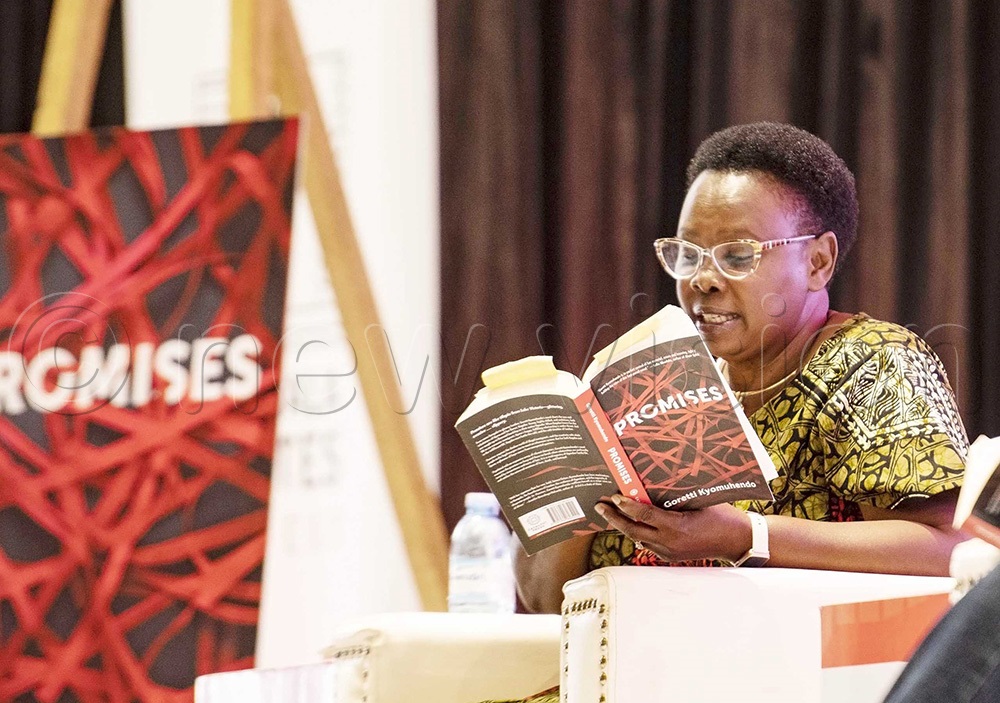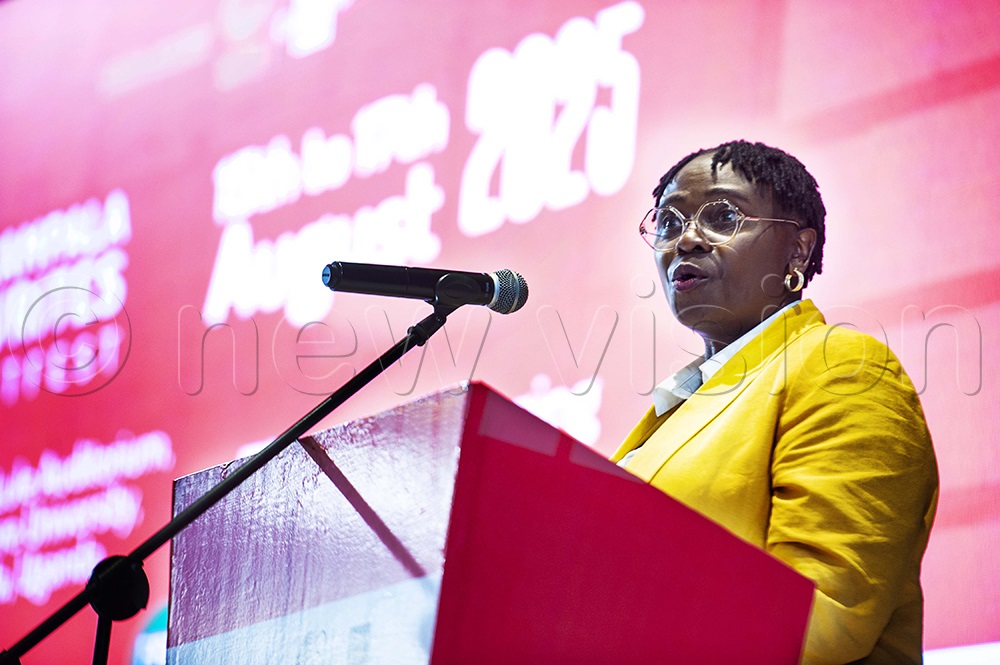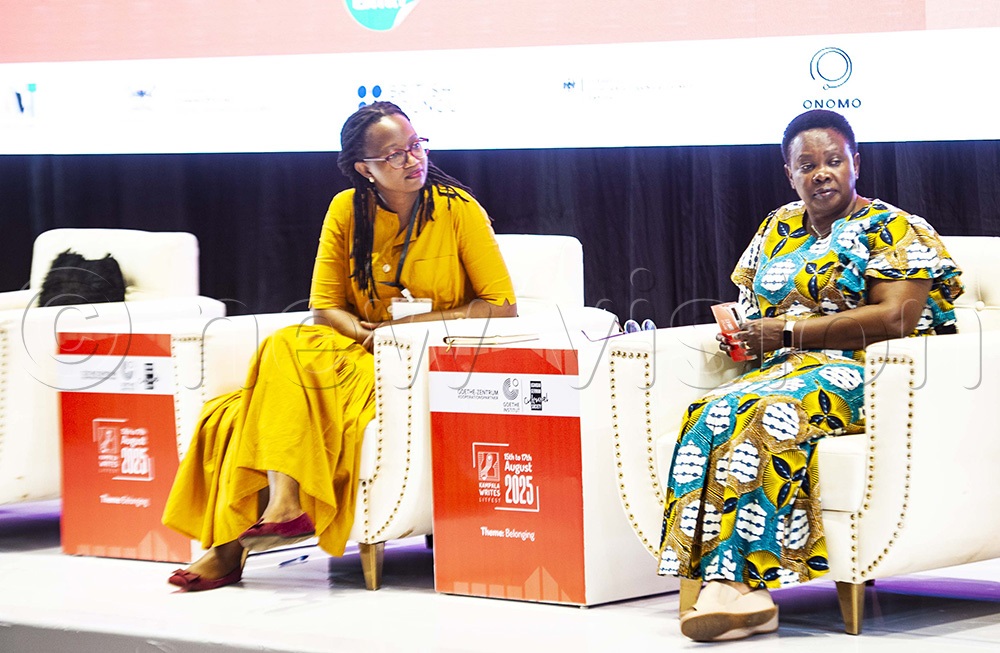2025 Kampala Writes Literature Festival was a huge success – Goretti Kyomuhendo
It had 5 panel discussions, 3 masterclasses, entertainment (including spoken word poetry, contemporary dance and a dramatisation), and a keynote speech from award-winning UK-based Ugandan author Jennifer Nansubuga Makumbi.
A panel discussion on Funding for the Arts in Times of Shifting Priorities: (L-R: Peter Primus, Charles Batambuze, Faisal Kiwewa, Elizabeth Mbabazi and moderator Dr Anna Adima. (Photo by Kalungi Kabuye)
___________________
For the second year running, best-selling author Goretti Kyomuhendo curated the Kampala Literature Festival, which took place from August 15th to 17th at the Yusuf Lule Auditorium in Makerere.
It had 5 panel discussions, 3 masterclasses, entertainment (including spoken word poetry, contemporary dance and a dramatisation), and a keynote speech from award-winning UK-based Ugandan author Jennifer Nansubuga Makumbi.
Goretti Kyomuhendo reads from her book, Promises, during the 2025 Kampala Writes LitFest held at Makerere on 16th August, 2025. (Photo by Kalungi Kabuye)
She sat down with Kalungi Kabuye for a recap and review of the festival. Excerpts:
(NOTE: this is the first of 3 articles reviewing the 2025 Kampala Writes LitFest)
Give us a brief recap of how the Festival went, were you happy with it?
As the programmer, the curator, yes, the festival went very well. It was a big success. How do I measure the success? One of them is sending out invitations to the speakers and moderators, and all of them turning up. They all honoured the invitation, and that was a success.
You can have the brilliant speakers and moderators, but where's the audience? You put the word out, and you just have to wait. Other countries require registration so they have an idea of how many people to expect, but because these are still early days for a literature festival in Uganda, we left it open and just hoped that people would come. And they did come.
The Yusuf Lule Auditorium seats 600, at any one point we had at least half the hall full, that's probably about 300 people. For the keynote speech, it was full. So, for me that was a big success.

Dr Jennifer Nansubuga Makumbi delivers a keynote speech during the launch of the 2025 Kampala Writes Literature Festival at the Yusuf Lule Auditorium, Makerere University on 15th August, 2025. (Photo by Kalungi Kabuye)
In addition, we didn't have to cancel or postpone any of the events, even though it was a busy weekend with many functions going around in Kampala. Concerts and everything, and international football matches. We are a very social people in Kampala, so we are talking of weddings, baptisms, and even funerals.
Q: Can you briefly explain your role as the curator of the festival?
It was curated by the African Writers' Trust, of which I’m the team leader. As an organization, we were consulted to curate the festival. That entailed the programming of events, choosing the theme, and bringing all the speakers together. And also, to create partnerships for the festival. For example, we had Makerere University, the British Council and the German Embassy on board.
After conceptualising the theme for the festival, we then curated the panel discussions, workshops, master classes, and entertainment. We also had the mini book fair, where publishers and independent authors brought their books for display and for sale.
What were the challenges?
The question was, who should we involve? The first edition was a kind of a trial, and we had only local writers. For the second edition we had to think of ways how to expand and scale it up, because that is how it should be. Every new edition should be a scaled-up version of the previous one, which shows growth. One of the things that we decided to scale up was to include international participation. of writers.
How did you come up with the theme, ‘Belonging’?
One of the things I looked at was global trends, what are things that we should be discussing in the literature at the moment? Because that informs all the other conversations that are going to evolve around that theme. The issue of belonging has become urgent and crucial because we are looking at a fractured world, and immigration is becoming a big thing. Who decides who belongs? Who decides how you belong? All that affects the stories that we are writing at the moment, and the conversations around literature. So, I wanted us to have those conversations, and the theme of belonging was suitable for that.
Once you get the theme, then it leads you into what the conversations should be like. I thought it was important to bring the diaspora into the conversation. If you are a writer, what does belonging mean to you? What does it feel like? What does it look like to you? Of the writers we had, three were Ugandans. One, Nick, left Uganda as a four-year-old when his parents ran away from Idi Amin, and has lived away ever since. As a writer, how does that affect the stories you write and that sense of belonging? Where is home to you? Are you permitted or allowed to write about a home you left at four years? If you ask Nick, he says he’s a Ugandan poet living in London. How does that come into the equation of writing stories, which stories are you writing about? And how do you feel when you're away from home? Does it affect the stories that you write? So it was around those conversations that led to the choosing of the writers.
How did you choose which writers and panellists to have, and how did you get them here?
It's always a challenge, but timing is very crucial. Nairobi has two festivals, in June and September, so we chose August. That way we can get people who plan to go for those festivals to come here. For example, the Nigerian publisher, Anwuli Ojogwu. planned to be in Nairobi for two weeks, so it was possible to invite her here. That happens all the time, there is no festival in the world that has enough money to bring in all the writers they need.

Sheila Akwany (L) and Goretti Kyomuhendo at the opening ceremony of the 2025 Kampala Writes LitFest inside the Yusuf Lule Auditorium, Makerere University on August 15th, 2025. (Photo by Kalungi Kabuye)
And it's always a challenge to assemble the right people for the panel discussions. What will be the rapport between the panellists? Are these people suited to create that rapport as panellists? Is there chemistry? Is one more outspoken, and will it overshadow everyone else, or are they at the same level? Who is going to moderate that panel?
As a curator, I'm thinking, is that coming out as I envisaged it? Is this the conversation I wanted, are these the kind of questions from the audience that I expected? Because there are always surprises, and sometimes you'll be a bit disappointed.
And the keynote speaker, how do you plan for that one?
The keynote is a big thing, so you need to find the suitable person who will do it justice, who will inspire, who will bring in audiences, who will raise the profile of the festival, and who is available. And Jennifer Makumbi Nansubuga did all that, and more.
What impact did the festival have on the industry, the community and society in general?
That goes back to the role of literature festivals, why do we hold them? A literature festival is a celebration of the written and spoken word, of stories and of books. It's a showcase where writers, who usually work in isolation, unveil all the hard work they’ve been doing. There's that aspect of a festival. Then there's the celebration of books that have been written in Uganda or outside Uganda. Book launches is one of the activities that we had.
We are showing that there are writers out there, they are writing, they are publishing, and this is the evidence. And let us celebrate it. All those things happened at the festival.
And it had impact on emerging writers, people who have loved books or the written word, book enthusiasts; they come to be a part of and be inspired, meet their literary idols, people probably they have admired for a very long time What does that do to that person? What is the impact of meeting your literary idol?
What about the community and the industry? What was the impact there?
Apart from the inspiration, there's also the economic impact. You have vendors, for example, who are coming to supply food to all these people. Food, drinks, hotels. There are the airlines, Uber drivers and the transport industry.
There’s tourism, because some of the international guests remained to do tourism. So, the economic impact is there.
The social impact was the inspiration of especially the young writers. One of my highlights was having secondary school students, both O and A level. I was looking at back at my own years as a literature student in secondary school, and how much we wished there could have been such an opportunity for us to come and listen to people who have done it.
Some of the students I met have been reading my work for a very long time, and I could see their excitement on finally meeting me. That was a great highlight for me. And those kids are going to remember this.
We held a training workshop specifically for them, in literature, and I spoke to them because most of them have read my work. We also got a tutor, Julius Ocwinyo, whose book they are currently reading and which is on the National Curriculum for Literature. Imagine them hearing from the horse's mouth, the book they have to write an exam on and pass. That was a huge impact, they will never forget that.
And then we donated copies of Jennifer Makumbi's book. and she also came and spoke to them as well.
What was your most memorable moment?
I would say the keynote address, and having the chance to pay tribute to Ngugi wa Thiong'o. That was really a big highlight because when I started curating the festival, Ngugi was still with us. When he died in May, I remember thinking that he was an alumnus of Makerere. He belonged to Uganda, Kenya, Africa and the US. So, we could claim a part of him. It also fit in very well with the theme of the festival - belonging. So, paying tribute to him by dramatising one of his most acclaimed plays, ‘I’ll Marry When I Want’, was a big highlight.
And the keynote went extremely well. It was very well received, very well attended, and very well articulated. It wasn't academic, it was something that was spoken from the heart and that resonated with a lot of people in the audience.
This is year two, what's the future of the festival?
That’s really a question for the organisers, we are just the curators. But I do envisage a third edition, and we are already having discussions about it and subsequent editions after that. Hopefully there will still be a budget for it, because funding is always a challenge for festivals. We have a momentum going, a lot of excitement and success, we should be able to build on that. The curator and programmer can change over the years, but the festival should remain.
Assuming the funds are there, and the organisers are still on board, what do you see as the future of this festival? How big is it going to be? What effect will it have on the industry?
It can only grow bigger, if we are to go by these two editions. There are all the reasons why we should keep running it and why it should keep growing.
For one, there is not any other festival in Uganda. And if you look at the broader region, Kampala is a central place. This year we had writers and people in the book industry who came from the DRC, the Sudan and Somalia. There is still not much terms of literature festivals in the region. By region I mean the eastern which includes the Horn of Africa. These are 12 countries but, apart from Nairobi which has three literature festivals, there isn't any other. There used to be the Hargeisa International Book Festival in Somaliland, but I don’t think it has happened since COVID.
So, we have all these countries, Somalia, Eritrea, Djibouti, Ethiopia, Sudan, South Sudan, Tanzania and Rwanda. This festival we had one writer from Somalia, and a publisher from Goma, DRC.
The festival should continue because it's offering something, not only to Uganda, but to the wider region. And people can get here easily, mostly you don't need a visa and mostly you don't need to fly in. You can just board a bus. I know some young people going for the Nairobi Literature Festival in September. They will board a bus, go to an Airbnb or to a friend or family and participate.
What about the market for writers, what impact will the festival have on that?
One of the panels I programmed was on publishing, and that was very intentional, because that is something that we need to be discussing. We need to have those conversations because publishing is one of the leading aspects of the book industry ecosystem. Publishing gives life to whatever we are doing. We had a literary agent from Nigeria, and one from Kenya.
The one from Nigeria, Ojogwu, runs Narrative Landscape Press, one of the leading publishing initiatives on the continent. They target all the big African diaspora writers and make their books accessible on the continent. For example, they got the rights to publish all Chimamanda Ngozi Adichie's books. So, it was a big deal to have her on one of the panels, discussing publishing in Africa. I’m sure many Ugandan writers got a chance to talk to her.
And we also had Mercy Kirui from Kenya, one of the few literary agents in the region. The presence of these two will definitely have a huge impact and produce many opportunities for Ugandan writers.
And most of these speakers stayed throughout the festival, which doesn't normally happen. Even Jennifer Makumbi stayed till the end.
Publishing is really very important. Going forward, we’ll probably have a master class on literary agenting and selling rights; these are things we should be engaging with because all those are the new trends.
In addition to the exhibition, we should be having a section for negotiating rights. A publisher who has come from Goma or Kinshasa and is interested in a book by a Somali writer should be able to meet at the festival. It is called a ‘Rights cafe’, and should be happening in addition to the selling of physical books.
What about new authors and maybe finding publishers?
That is why the Nigerian publisher was here; she's looking for new voices. In fact, she’s just opened a branch in Nairobi, Landscape Narrative East Africa.